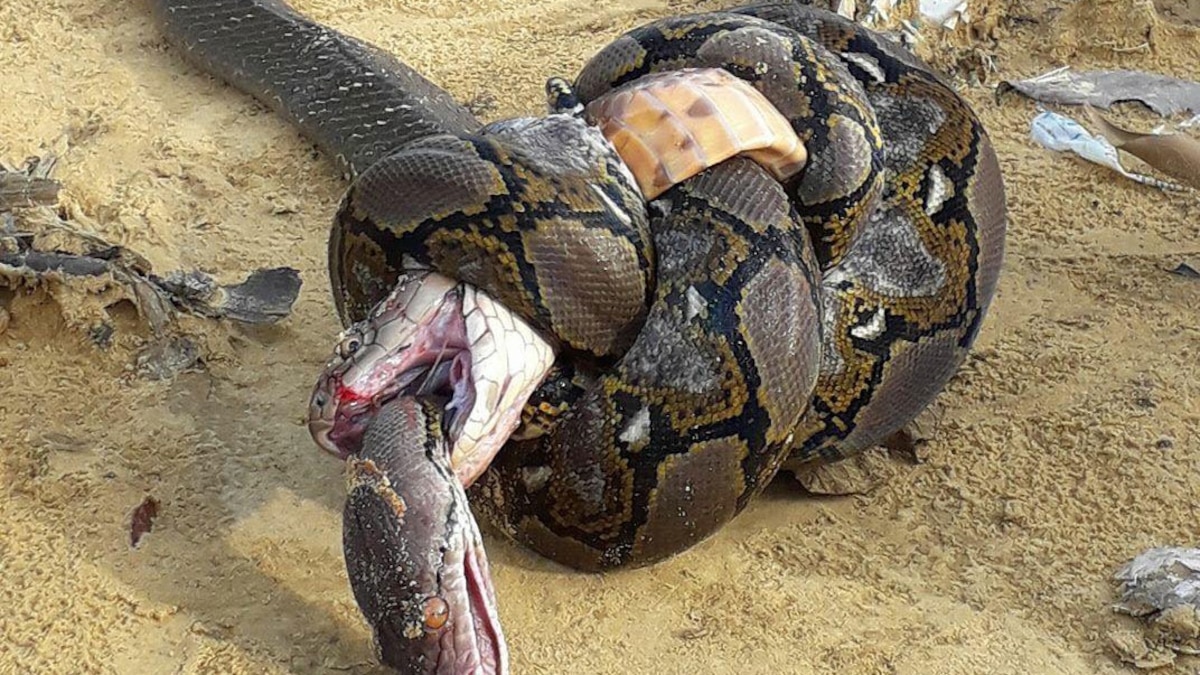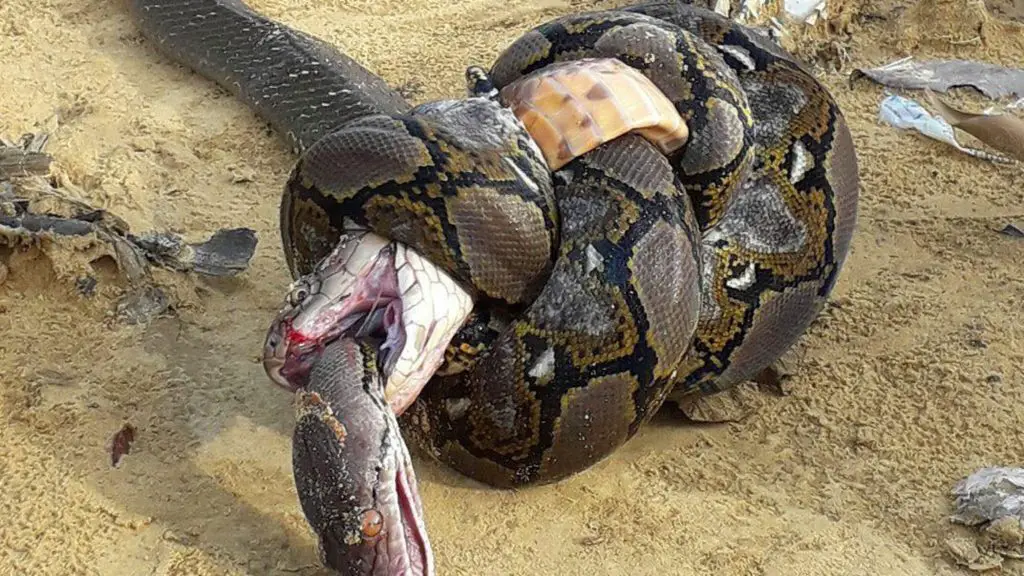Pythons are fascinating creatures that have captured the imagination of people around the world for centuries. These large, powerful snakes are known for their impressive size and strength, as well as their ability to swallow prey whole. But what about other snakes? Do pythons eat their own kind?
The answer is yes, pythons are known to eat other snakes. In fact, some species of pythons are known to be particularly adept at hunting and consuming other snakes, making them top predators in their ecosystems. But why do pythons eat other snakes, and what are some of the strategies they use to catch and consume their prey? Let’s explore the world of python predation and find out.
Yes, pythons are known to eat other snakes. In fact, they are one of the few snake species that will eat other snakes as a regular part of their diet. This is due to their large size and muscular build, which allows them to overpower and swallow other snakes whole. Pythons have been known to eat a wide variety of other snake species, including venomous snakes like cobras and vipers.

Do Pythons Eat Other Snakes?
Pythons are one of the largest and most interesting snake species in the world. They are known for their size, strength, and unique feeding habits. One of the most common questions asked by snake enthusiasts is whether pythons eat other snakes. In this article, we will explore this topic in detail.
Pythons as Carnivores
Pythons are carnivorous snakes that feed on a variety of prey, including rodents, birds, and other reptiles. They are known for their ability to consume large prey items, thanks to their flexible jaws and muscular bodies.
When it comes to other snakes, pythons are no exception. In fact, they have been known to eat other snakes, including venomous species like cobras. However, their diet is not limited to snakes, and they will consume any prey that they can overpower and swallow.
Benefits of Eating Other Snakes
Eating other snakes can provide pythons with several benefits. First, it allows them to consume a high-protein meal that is rich in nutrients. Second, it eliminates potential competition for food and territory. Finally, it can help to control populations of venomous snakes in areas where they are a threat to humans and other animals.
Pythons Vs. Other Snakes
When it comes to consuming other snakes, pythons have several advantages over their prey. First, they are much larger and stronger than most other snake species, allowing them to overpower their prey with ease. Second, they have a highly effective digestive system that allows them to break down and absorb nutrients from even the toughest prey items.
Types of Snakes Eaten by Pythons
Pythons are known to consume a variety of snake species, including rat snakes, king snakes, and even venomous species like cobras. In some cases, they have been observed consuming multiple snake species in a single meal.
Benefits of Eating Other Snake Species
By consuming a variety of snake species, pythons can benefit from a diverse range of nutrients and minerals. This can help to keep them healthy and strong, and may even improve their reproductive success.
Dangers of Eating Other Snake Species
While consuming other snake species can provide pythons with many benefits, it can also be dangerous. Some snake species are venomous and can pose a threat to pythons, even if they are able to consume them. In addition, consuming multiple snake species in a single meal can increase the risk of indigestion and other digestive problems.
Conclusion
In conclusion, pythons are carnivorous snakes that are known for their ability to consume a variety of prey, including other snakes. While this behavior may seem unusual, it is a natural part of their diet and can provide them with many benefits. However, it is important to remember that consuming other snake species can also be dangerous and should be approached with caution.
Frequently Asked Questions
Do Pythons Eat Other Snakes?
Yes, pythons are known to eat other snakes. In fact, some species of pythons are known to exclusively eat other snakes. Pythons have been observed preying on a wide variety of snake species, including venomous ones.
Pythons have a unique ability to stretch their jaws to accommodate larger prey, which makes them formidable predators. They are also ambush hunters, so they often surprise their prey by striking quickly and coiling around them before constricting and suffocating them.
What Types of Snakes Do Pythons Eat?
Pythons are known to eat a wide variety of snake species, including rat snakes, king snakes, garter snakes, and even venomous snakes like cobras and vipers. The specific types of snakes that pythons prey on often depend on the species of python and the region they inhabit.
In some cases, pythons have been observed preying on snakes that are larger than themselves. This is possible due to their ability to stretch their jaws and swallow prey whole, which allows them to consume larger animals than other snakes of similar size.
How Do Pythons Digest Other Snakes?
Pythons have a unique digestive system that allows them to break down and digest their prey, including other snakes. After consuming their prey whole, pythons secrete digestive enzymes that break down the prey’s tissues.
The digestion process can take several days to a few weeks, depending on the size of the prey. During this time, the python’s metabolism increases, and its body temperature rises as it works to break down the prey. Once the digestion process is complete, the python will expel any indigestible parts, such as fur or bones, in the form of feces.
Do Pythons Hunt Other Snakes for Food?
Yes, pythons actively hunt other snakes for food. They are opportunistic predators and will take advantage of any prey that presents itself. Pythons will often use their sense of smell and heat-sensing abilities to locate potential prey, including other snakes.
Pythons are also known to be cannibalistic, meaning they will prey on other pythons if the opportunity arises. This behavior is more common in captivity than in the wild, but it has been observed in some wild populations as well.
Are Pythons at Risk of Being Eaten by Other Snakes?
While pythons are formidable predators, they are also vulnerable to predation by other snakes. Young pythons are particularly vulnerable to predation, as they are smaller and less experienced hunters than their adult counterparts.
In some regions, pythons may be preyed upon by other large snake species, such as king cobras or anacondas. However, adult pythons are generally too large and powerful to be preyed upon by most other snake species.
Indigo Snake Eats Python 01 – Snake Cannibalism
In conclusion, pythons are known to be formidable predators in their natural habitats. Despite their size and strength, they are not immune to being preyed upon by other predators. However, they are also known to be cannibalistic, and will readily consume other snakes when food is scarce.
While some species of pythons are known to specialize in eating other snakes, such as the African rock python, others may not necessarily target snakes as a primary food source. Instead, they may rely on a variety of prey items, ranging from small mammals and birds to larger ungulates.
Regardless of their dietary preferences, pythons are fascinating creatures that continue to capture the imagination of scientists and nature enthusiasts alike. Whether you are interested in their feeding habits or simply admire their impressive size and strength, there is no denying that pythons are among the most iconic and intriguing species in the animal kingdom.


